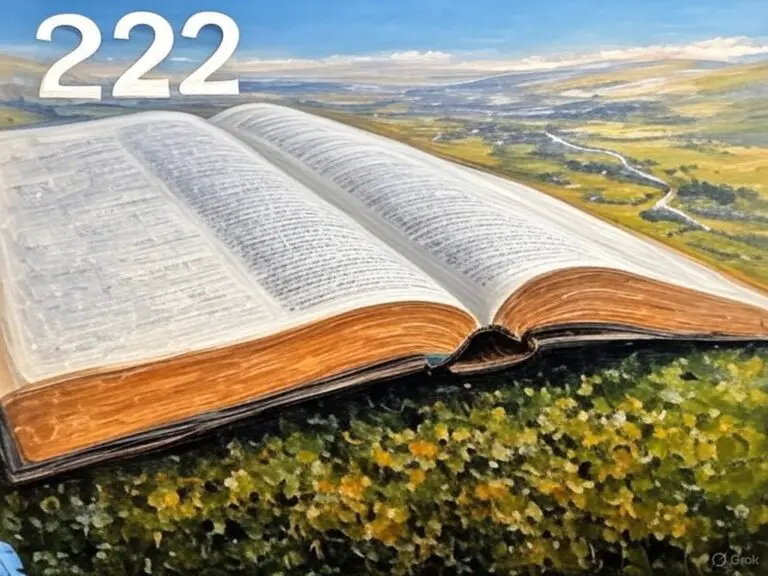From Genesis to Revelation: The Resounding Echo of Number 14 in Biblical Lore

In the tapestry of biblical numerology, certain figures emerge with profound symbolism, weaving a narrative that transcends mere digits. Among these, the number 14 stands distinct, carrying layers of meaning shaped by historical events, theological concepts, and prophetic implications. This number’s recurrence and significance in scripture invites a deeper exploration of its spiritual and symbolic dimensions within the biblical context.
I. Introduction to Biblical Numerology and the Significance of Numbers
A. Overview of Numerology in Biblical Context
Numerology in the biblical context is not merely the study of numbers but an exploration into the deeper, often mystical, meanings ascribed to these numbers in the sacred texts. This discipline considers the patterns and symbolic significance of numbers, revealing how they paint a larger picture of divine truths and spiritual principles. From the creation story to the visions in Revelation, numbers form a silent yet powerful narrative thread throughout the Bible.
B. The Role and Importance of Numbers in the Bible
Numbers in the Bible serve multiple functions, functioning as more than quantitative values. They symbolize concepts, mark periods, and signify divine order. For instance, the number seven represents completeness and perfection and is often associated with God’s creation. Similarly, the number 40 denotes a period of testing or judgment, as seen in the 40 days of the flood or Jesus’ 40 days in the desert. Understanding these numbers enriches the comprehension of biblical stories and prophecies.
II. The Symbolism of Number 14 in the Bible
A. Historical References and Events Linked to Number 14
The number 14 holds historical significance, echoing through pivotal biblical events. Notably, it marks the generations from Abraham to David, from David to the Babylonian exile, and from the exile to Christ, as outlined in the Gospel of Matthew. This structuring underscores the providential unfolding of God’s plan through history, with the number 14 acting as a marker of divine orchestration and fulfillment.
B. Theological Implications of Number 14
Theologically, the number 14 embodies aspects of deliverance and salvation. The 14th day of the first month is the Passover, where the lamb’s blood signified redemption for the Israelites. This event prefigures Christ’s sacrifice, hinting at the deeper layers of redemption and grace interwoven with the number 14. The number’s occurrence and context within scripture invite reflection on God’s saving actions and the cyclic nature of divine grace.
C. Prophetic Significance of Number 14 in Biblical Prophecy
In biblical prophecy, the number 14 symbolizes expectation and completion. It signifies the culmination of periods and the fulfillment of divine promises. The number’s layered use in genealogies and prophetic timelines points to a meticulously crafted divine plan, where each number holds the key to understanding the broader eschatological narrative.
D. Numerological Connections to Other Biblical Concepts
The number 14 has numerological connections that enhance its symbolism in the Bible. By combining its digits, 1 (symbolizing unity) and 4 (representing creation), it underscores the unity of creation under divine sovereignty. Also, as a double of 7, which stands for perfection, 14 emphasizes a reinforced theme of completion and the fullness of divine purposes. These connections offer deeper insights into why 14 is significant in biblical narratives, reflecting the holistic and perfected nature of God’s plans.
III. Number 14 in Specific Biblical Passages
A. Number 14 in the Old Testament
In the Old Testament, the number 14 appears in various contexts, each adding a unique dimension to its significance. For instance, the dedication of Solomon’s temple lasted 14 days, a period signifying celebration and consecration. Additionally, the instructions for observing the Passover and the Feast of Tabernacles involve the number 14, linking it to themes of liberation, provision, and divine presence.
B. Number 14 in the New Testament
The New Testament continues the thematic threads associated with the number 14. The genealogy of Jesus, as presented in Matthew, is structured around the number 14, emphasizing the fulfillment of messianic prophecies and the continuity of God’s redemptive plan. This structuring not only highlights historical lineage but also weaves a narrative of grace, promise, and divine intervention.
C. Comparative Analysis of Number 14 Across Different Scriptures
Comparing the occurrences and contexts of the number 14 across different scriptures reveals a tapestry of meaning. While the Old Testament associates the number with covenant, celebration, and consecration, the New Testament underscores fulfillment, grace, and divine orchestration. This comparative analysis enriches the understanding of the number 14, showcasing it as a multifaceted symbol within the biblical narrative, woven intricately into the fabric of God’s unfolding story.
IV. FAQs
Q: What does the number 14 symbolize in biblical numerology?
A: In biblical numerology, the number 14 symbolizes deliverance and salvation. It is often associated with God’s saving actions, the cyclic nature of divine grace, and the fulfillment of divine promises.
Q: How is the number 14 related to significant events in the Bible?
A: The number 14 is related to significant biblical events such as the genealogies from Abraham to Christ, the Passover on the 14th day, and the dedication of Solomon’s temple for 14 days, highlighting themes of redemption, celebration, and divine orchestration.
Q: Why is the number 14 important in the genealogy of Jesus in the New Testament?
A: The number 14 is important in the genealogy of Jesus as it structures the lineage into three sets of 14 generations, emphasizing the fulfillment of messianic prophecies and illustrating the meticulous unfolding of God’s redemptive plan.
Q: Does the number 14 have the same meaning in both the Old and New Testaments?
A: While the number 14 maintains a consistent theme of divine orchestration and fulfillment, its specific meanings and associations vary between the Old and New Testaments, reflecting the evolving narrative of God’s interaction with humanity.
Q: Can the number 14 in the Bible be interpreted in a modern context?
A: Yes, the symbolism of the number 14 can be interpreted in a modern context by reflecting on its themes of deliverance, salvation, and divine fulfillment and considering how these themes resonate with contemporary spiritual journeys and understanding.
Q: Are there any prophetic implications of the number 14 in the Bible?
A: Yes, the number 14 has prophetic implications, particularly in its symbolic representation of expectation, completion, and the meticulous nature of divine plans, as evidenced in biblical prophecies and genealogies.
Q: How is the number 14 used in biblical rituals and celebrations?
A: The number 14 is used in biblical rituals and celebrations, such as the Passover and the Feast of Tabernacles. It signifies liberation, divine provision, and the presence of God and marks periods of reflection, celebration, and spiritual significance.
Q: What does the 710 angel number mean?
A: The 710 angel number is often interpreted in spiritual circles as a message of encouragement. It indicates that one’s positive thoughts and actions are aligned with divine will, leading to beneficial outcomes and spiritual growth.
Q: What does the 3636 angel number mean?
A: The 3636 angel number is commonly understood as a sign of support and love from the angels. It suggests that one should trust one’s intuition and inner wisdom and that one’s material and emotional needs will be met as one pursues one’s life’s purpose.
V. Conclusion
A. Summarizing the Symbolic Essence of Number 14 in the Bible
The number 14 in the Bible encapsulates a rich tapestry of meaning, from historical events to theological implications and prophetic significance. It signifies deliverance, salvation, divine orchestration, and the fulfillment of God’s promises, serving as a powerful symbol of divine intervention and grace throughout the biblical narrative.
B. Reflecting on the Broader Impact of Number 14 on Biblical Interpretation
Reflecting on the number 14 within the broader context of biblical interpretation invites a deeper understanding of the divine narrative and God’s interaction with humanity. It encourages a contemplative approach to scripture, recognizing the intricate patterns and profound symbolism that underpin the biblical text and shape spiritual understanding.
VI. Suggested Readings
These books offer insightful perspectives into how numbers shape the biblical narrative, revealing the intricate patterns and divine wisdom encoded within the sacred texts.
- “Number in Scripture: Its Supernatural Design and Spiritual Significance” by E.W. Bullinger
This classic work explores the significance of numbers in scripture, providing a comprehensive analysis of biblical numerology, including the number 14, and its profound implications for understanding scripture. - “The Mystery of Numbers: A Numerological Guide to Your Character and Destiny” by Richard Webster
This book offers insights into the spiritual and symbolic meanings of numbers, including those found in the Bible, helping readers to uncover the hidden messages and divine guidance in their lives. - “Biblical Numerology: A Basic Study of the Use of Numbers in the Bible” by John J. Davis
John J. Davis presents a scholarly yet accessible study of numerology in the biblical context, examining the significance and use of numbers, such as 14, in various scriptural passages and their implications for biblical interpretation.
These readings provide a gateway to understanding the intricate world of biblical numerology and the profound symbolism of numbers like 14. They invite readers into a deeper exploration of scripture, revealing the layers of meaning and divine wisdom embedded in the sacred texts.






